Author: reporter reporterson
“Seehofer’s 69” – Die Zeit
“This new law is a chance”
Assignment 4
Freyan Bosma
Elias Arvidsson
Fredrik Jarl
Group 8 – Interview on political opinion
By Andrea Gómez-Bobillo, Chloé Lhote – Bérogin, Zinovia Fragkiadaki
How do Gothenburg citizens feel about the upcoming elections in Sweden? Robert Johanson, a 49 years old Software Engineer, is talking about his political preferences and the main issues that need to be solved by the predominant political party after the 9th of September.
Group 6 – interview on political opinion
By Moa Persson, Amy Renyu Jin, Daniel Mckenna
Censorship or democracy? Marxist Students face exclusion from Göta Student Union
The association of Marxist Students has been an active member of the Göta Student Union for the past four years. Recently, there has been some backlash against them, with board members allegedly questioning their adherence to democratic principles. In three weeks’ time, Göta Student Union -the biggest student union of Gothenburg University- will decide whether or not the association is allowed to remain part of the Union.
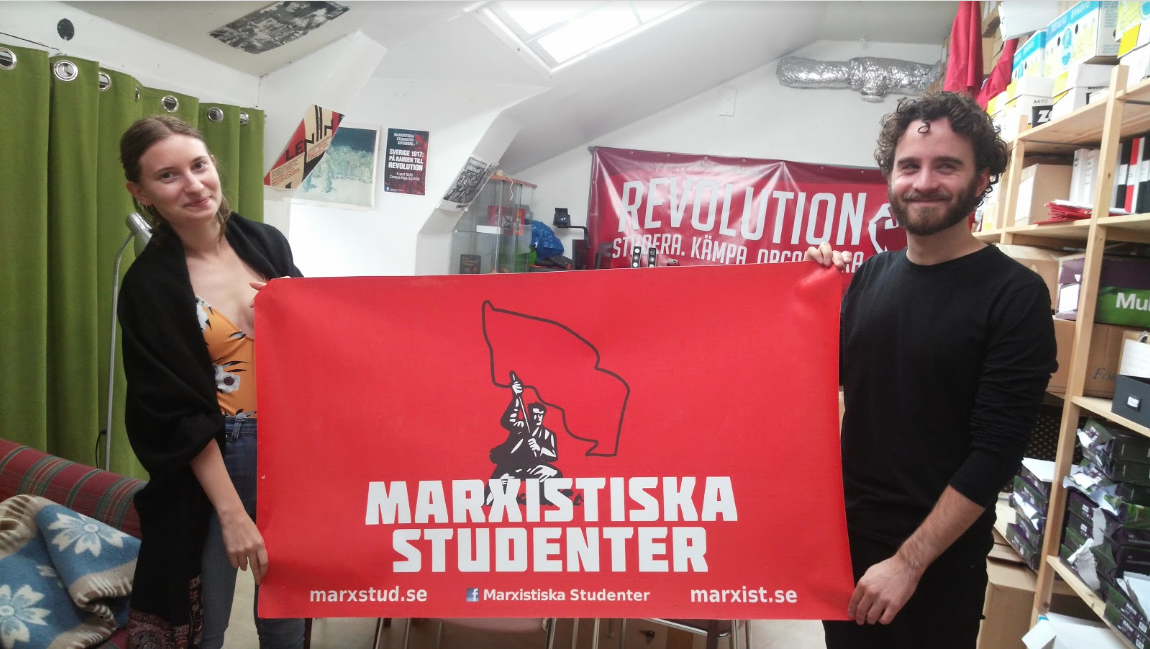
Sebastian Ingvarsson and his colleague from Marxist Students in their Gothenburg office (4 September 2018)
The Marxist Students feel that removing their membership would be hypocritical. “Excluding us from the Student Union would be an act of censorship,“ argues Sebastian Ingvarsson, an active member of the Marxist Students association.
According to the association, the group is facing exclusion on political grounds – some representatives of the Göta Student Union (GSU) Committee Board consider Marxist ideology to be incompatible with GSU’s internal rules, and could possibly clash with principles of democracy. Members of the MS association suspect that one or more people in the GSU, who personally hold conservative values, are spearheading the effort to exclude them.
The reason Marxistiska Studenterna is viewed so critically, according to Ingvarsson, is the misconception that the association follows Stalin’s ideology. To these students, however, this could not be further from the truth: “Our movement follows in the footsteps of Trotsky,” explains Ingvarsson. “Our predecessors were actually the first victims of Stalinist purges, which makes these accusations against us even more ridiculous” Ingvarsson insists that the Marxist Students regard everyone as equal and have always been advocates for democracy.
In response to the threat of exclusion from the GSU, the MS association has started a “campaign for Marxist rights“, through which they hope to raise awareness of the controversy and trigger a public debate. According to the association, the GSU would prefer not to confront the issue openly.
When reached for comment, Axel Andersson, chairman of the Göta Student Union, claimed that the Marxist Students might soon see their student association status revoked not because of their political beliefs, but due to a lack of documentation. “No one is being excluded from Göta student union,” said Andersson.
If their membership is not renewed, the Marxist Students will receive less funding from the Union. While the financial setbacks might be the biggest concern, losing the status as a recognized student association will come with other drawbacks as well.
In order to get the status of a student association or have this status renewed, each group needs to submit relevant documentation every year. “This spring, the documentation of Marxist Students was lacking, so they have been given the opportunity to send in additional documentation” explains Andersson. “Their status will be decided upon during the next General Assembly meeting, on 24th September.”
The Marxist Students organize weekly meetings open to everyone, where participants discuss current political events around the world from a Marxist perspective. They are not officially affiliated with any political party, but in the Swedish elections happening this weekend, they advocate for the Left Party (Vänsterpartiet).
The West Link Project: a key issue for Gothenburg
By Akla Elhillo, Moa Persson and Giulia Zala
With the Swedish national elections just around the corner, one of the main issues being discussed across the city of Gothenburg is the West Link project. Initially proposed over 20 years ago, the West Link project continues to divide the city’s public opinion.
The project aims to facilitate mobility and improve the transportation network along the western region of the country. In 2014, a referendum concluded that the majority of the the people in Gothenburg were against the construction of this project.
Nevertheless, the council led by the Social Democrats intends to proceed with the construction of the multi-billion dollar project as planned. They argue that the project will bring about many economic and social benefits to the city and the surrounding regions.
Erik Solfors, a young representative of the Social Democrats said,
– There was no real discussion about this project. However, it is too late to stop it now. We will make it work!
Solfors is also concerned about the safety issues regarding the construction of the project but also added that it was legally agreed on by the majority.
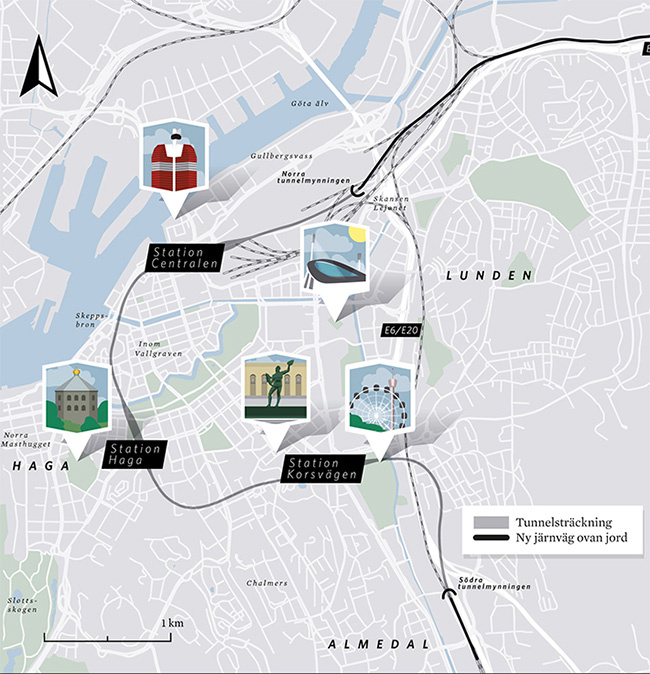
On the other hand, the Democrats refuse this narrative. They claim that the safety, economic and environmental risks overweigh the benefits. Engineer Mats Jakobsson, a representative of the Democratic Party, thinks that the government should listen to the people’s decision. Jakobsson argued that the West Link project might result in the bankruptcy of the City of Gothenburg. He is especially concerned about the risks related to building an underground tunnel without carefully considering the city’s geological conditions.As a matter of fact, the tunnel should run for 2 km trough clay and fill and this could make the building and the maintenance process quite complicated. This would not only not bring any benefits to Gothenburg and the surrounding areas, but would translate into a waste of public funds and resources.
Anna-Karin Hammarstrand, a local entrepreneur and representative of the Democrats, is also fearful of the safety and environmental risks that the project might have. Hammarstrand said,
– Like other projects implemented in the past, the West Link project will cost twice as much and take twice the time to build. The project will have dire environmental effects as the rate of air pollution will increase due to trucks accessing the city.
When asked about the investment that was already spent to initiate the construction of the project, Hammarstrand said
– The bad decisions of the government is not our problem. There are many other alternatives such as the Gårda Central Station that can cost less to construct and have fewer impacts on the environment and safety of the city.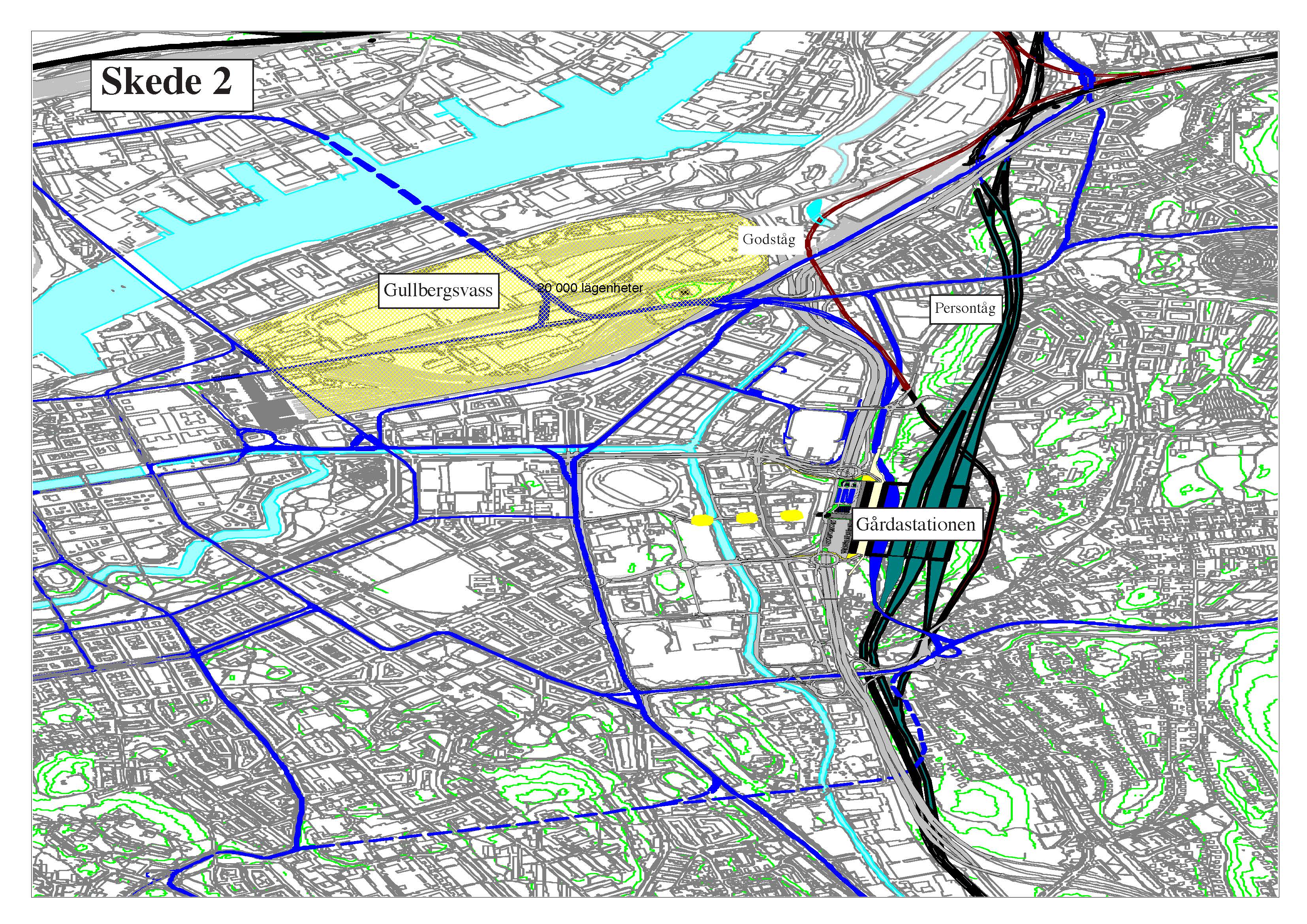
The West Link project seems to be the deal breaker in the coming election. We will have to wait until Sunday to see if this controversial project will come to life in the next decade or the voice of the majority will put an end to it.
Lack of belief in the political promises
When groups of masked youths burnt down about 80 vehicles around Gothenburg about three weeks ago, the major politicians of Sweden came running. After the politicians have left the parking lot in Västra Frölunda people still have questions.
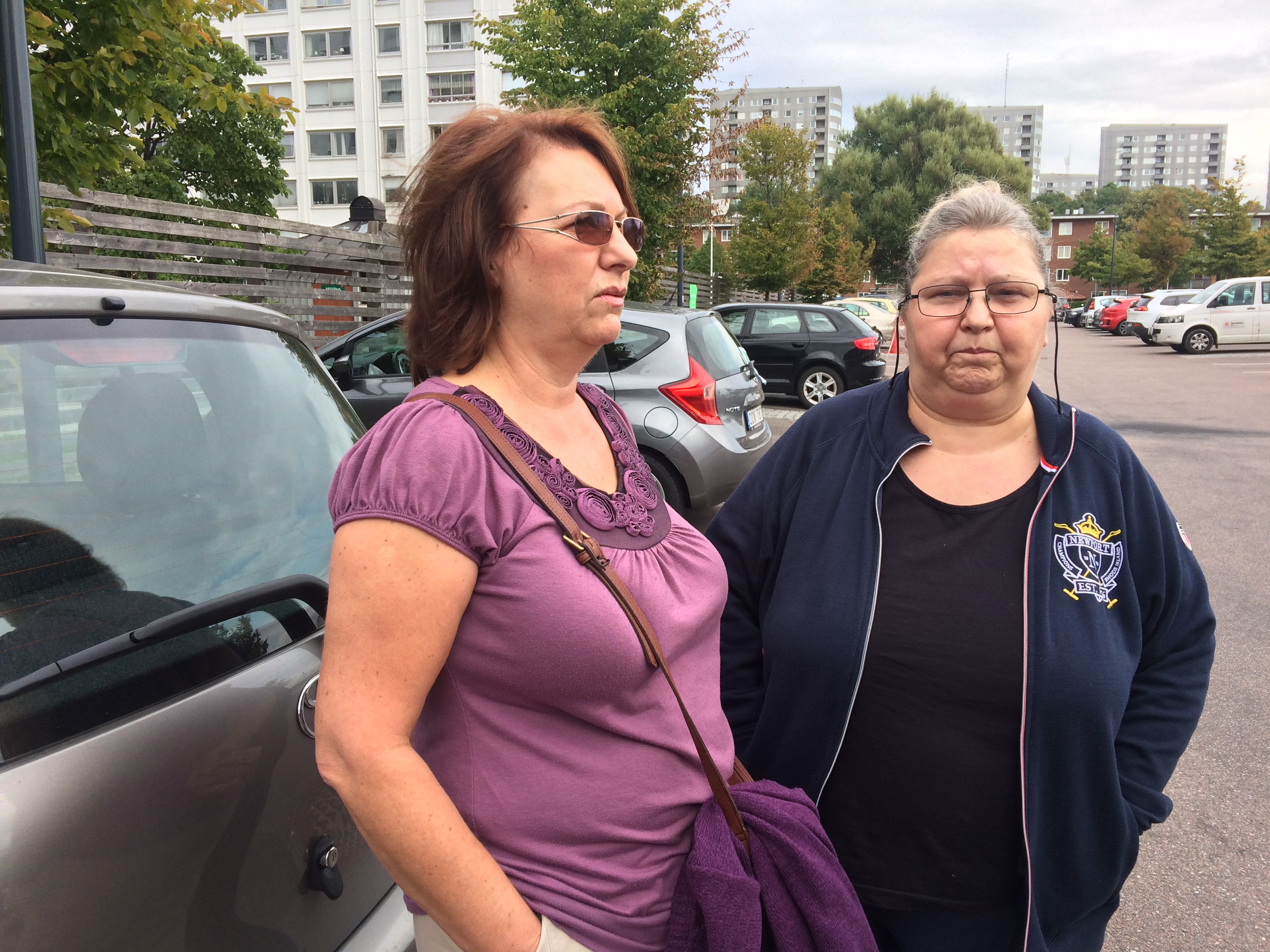
Lidija Stefanovska and her sister Elizabeta Ivanovska in Frölunda
The fires in Gothenburg casted light on the area’s social problems: segregation, unemployment and drugs. Politicians reacted strongly, demanding actions. The biggest car fire was at Frölunda torg where more than 30 cars were set on fire. One of the cars belonged to Elizabeta Ivanovska:
“Do you think Stefan Löfven would come here, if there wasn’t an election?” she asks and laughs at her own question.
”It was a nice car. I had it for twelve years, but I took good care of it. Finally, I only got 30.000 crowns from the insurance. But what car can you buy for that?” she says.
The days following the fires the political parties showed up in Frölunda and held press conferences at the parking lot.
Robin Synnergren also lives in the area: “When I was looking for a parking space at that time, I couldn’t find one because Jimmie Åkesson (the leader of the Sweden Democrats) was here. The day before it was Stefan Löfven. My point of view is that they only come here for the votes,” he says.
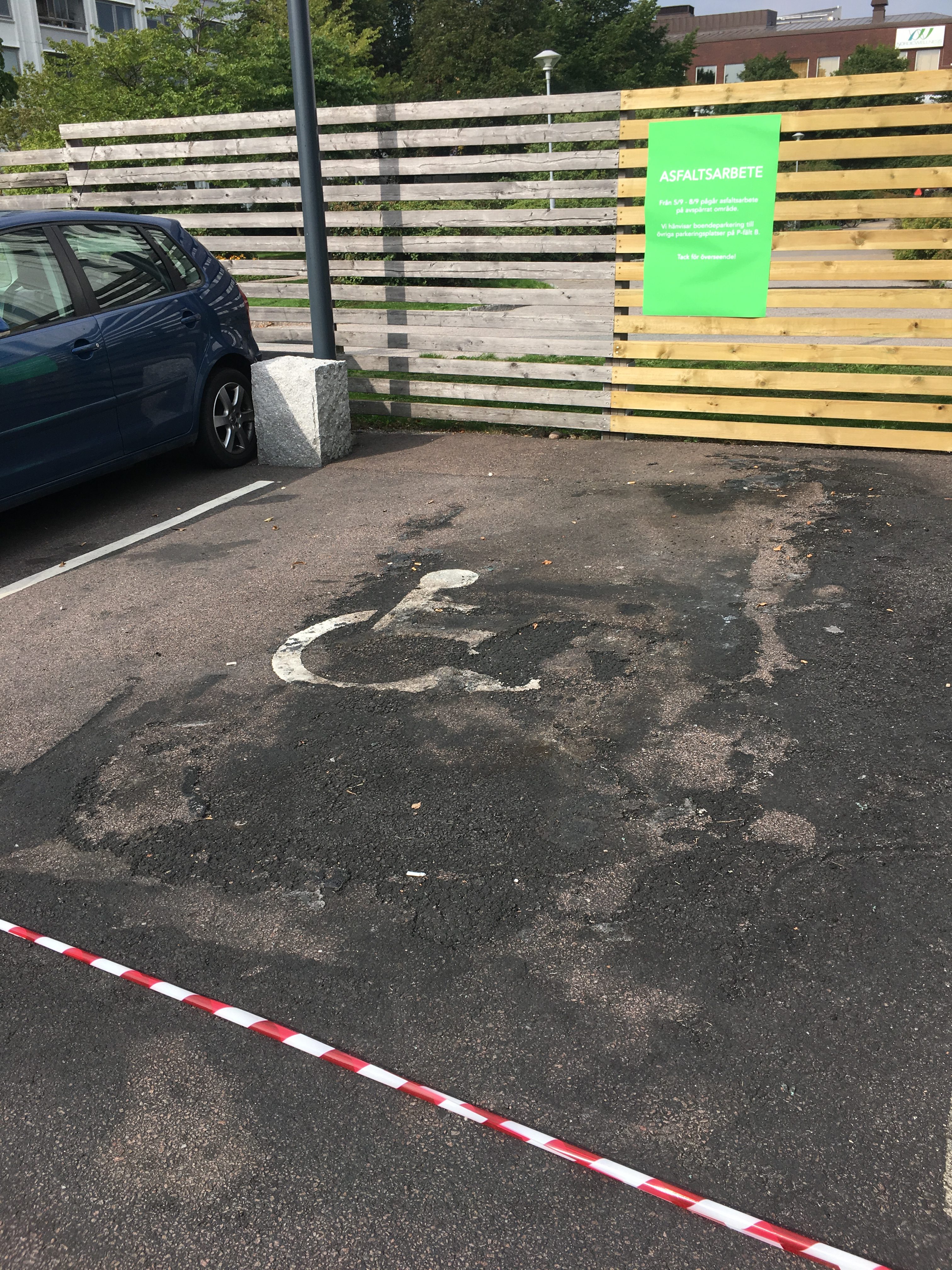
A parking space in Västra Frölunda in Gothenburg where numerous cars were set on fire in August
This behavior of the politicians was a typical ritual in times of elections, says Peter Esaiasson, professor in Political Science at the University of Gothenburg. According to his opinion the political parties which went to Frölunda benefitted.
”They want to create a gathering under the flag-effect,” he adds.
According to Esaiasson, the major consequence of the fires was a change in the political agenda. The whole summer global warming was in the center of attention but now questions on criminality, segregation and more police power took over the debate.
People in Frölunda have different answers on the question why the incidents happened – drugs, segregation and unemployment. But, all agree in one point: they want more police and tougher punishments.
“Crime rates are growing, but the number of people in prison is not growing,” says Robin Synnergren.
The owner of a local falafel restaurant nearby shares a similar opinion: ”Sweden is a paradise for criminals!”
He prefers to be anonymous and he is not comfortable to voice his political opinion in the street:
”The politicians came, but only because there is an election, they didn’t come for us.”
Has this affected your vote?
”Sometimes I vote for Socialdemokraterna sometimes for Moderaterna, it really doesn’t matter,” concludes the restaurant owner.
Elias Arvidsson
Nina Mueller
Jan Lamhauge
”It is sympathetic and darn cheap” – Local cafe becomes a conscientious hub for the seniors
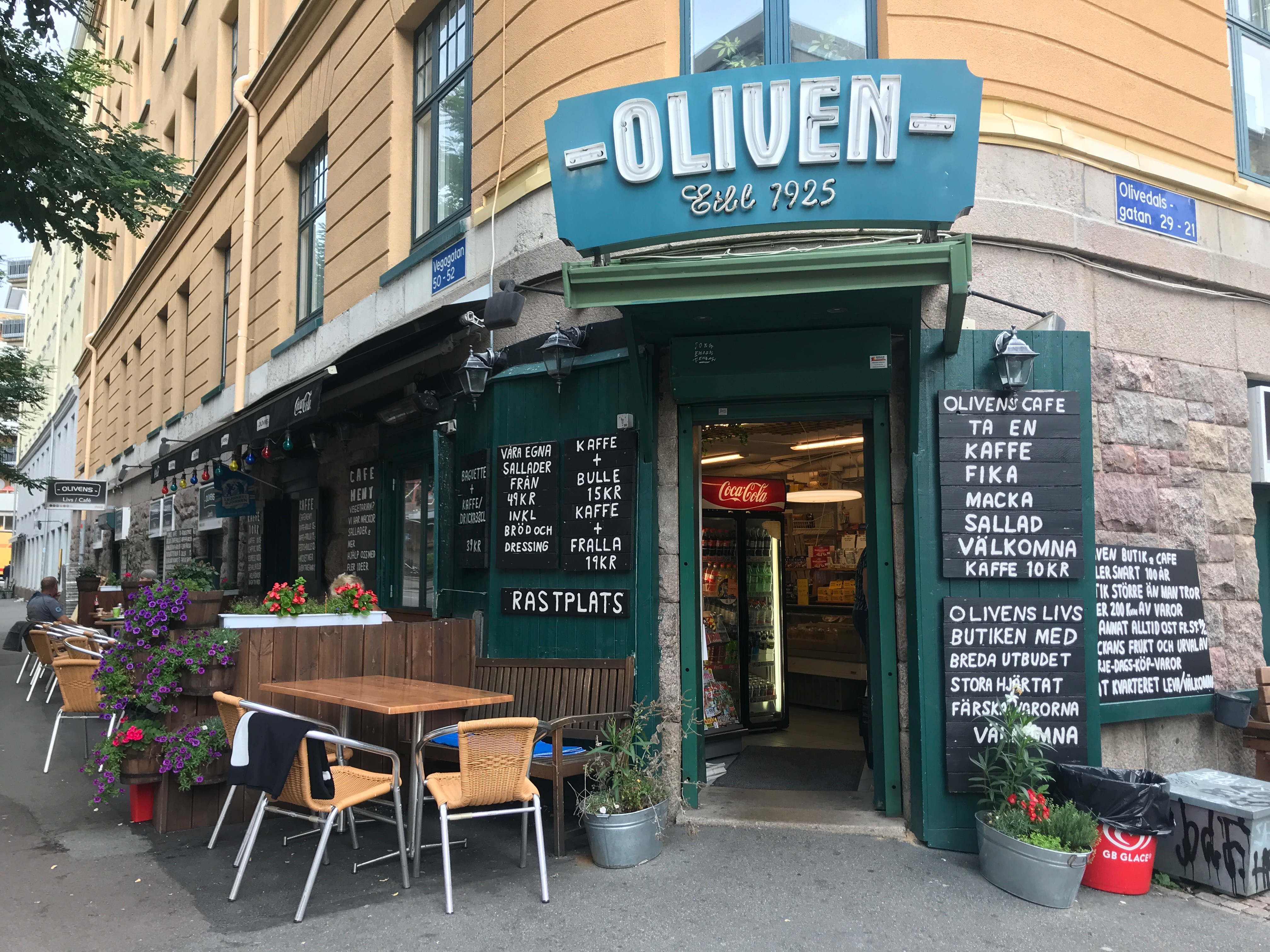
Skafferi Oliven. Image: Amy Renyu Jin
With a façade decorated with plaques of affordable deals, rattan chairs and an integrated grocery store, Olivens Skafferi might not spell the recipe for a trendy café. Situated in Linnéstaden, the café has attracted numerous customers with its coffee and bun at 15kr, but more importantly, it has become a conscientious community hub for the locals to meet, socialize and take care of each other.
Katarina Nilsson, the owner of Olivens Skatteri since 1990, decided to include a café in the store around eight years ago. From the simple two sets of tables and chairs at the time, today’s cafe has expanded with an outdoor seating area, providing a genuine homely atmosphere for the customers.
“I have seen kids grow up here and now they have gotten kids of their own. That is pretty fun to see”, says Nilsson.
So what is so special about Olivens Skafferi? According to Nilsson, the friendly staff and humble prices combined are certainly a reason for the customers to return constantly.
”It is sympathetic and darn cheap”, says regular customer Magnus Lindström.
Nilsson adds, “ It is especially the older pensioners that come here for a fika. They get to know each other and arrange time to meet up”. The place seem to bring people together, and it has become part of the daily life for the senior regulars.
According to Nilsson, the regulars keep track of each other. If someone did not show up one
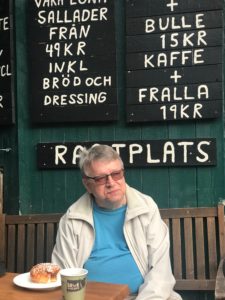
Christer Öberg, one of the regular costumers. Image: Amy Renyu Jin
day, they would go and visit his/her house to check that everything is fine. When a elderly regular needed help taking care of himself, others even helped with getting him into a nursing home.
Christer Öberg lives in the neighborhood and has been visiting Olivens Skafferi since the 80s. According to Öberg, he often comes over to buy the Newspaper and take a fika. Over the years he has acquainted himself with many other locals who visit the cafe regularly. One of them is Karin Makar, who comes here almost everyday.
“I think it is social with good prices. It is a very pleasant place”, says Makar.
Over the years, Olivens Skafferi has gone through rough patches as well as good. The cafe managed to get through the setbacks but it would not have survived without the regulars, says Nilsson.
By: Charlotta Lindblom, Emma Bratt and Amy Renyu Jin.
Why Vote? The Gothenburg youth’s perspective
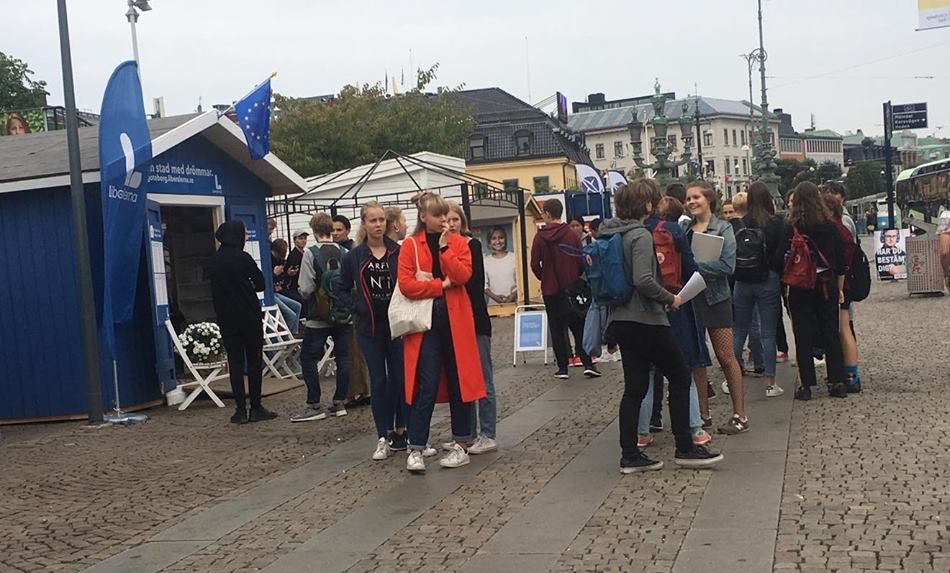
Young people in front of the Liberal party booth
BY LORINA CERNOGAL, ZINOVIA FRAGKIADAKI & JOHANNA FINNHOLM
Elections in Sweden are set to be held on September 9 and young voters of Gothenburg are an important group for the parties to reach.
According to the 2018 Valmyndigheten statistics, the young generation of Gothenburg accounts for 22.9% of the city population, becoming an increasing political force that can affect the turnout of these elections. So why is it important for the youth to become educated on political matters and hold the parties accountable on their agenda?
“I have already voted and I think it is important to ensure equality and keep society together. Moreover, since social media has some bad consequences for democracy, like the manipulation of information that gave Trump the presidency ” Josipa Pilipovic, a 28 year old student.
By voting, the youth influences issues that might affect their lives for years to come, including education, employment and healthcare. Though millennials have found their footing in a well-established economy, the major issues that they care about are: healthcare, environment, gender equality and immigration.
Although there are many ways to engage in politics, the youth participates less in traditional methods of influencing politics and prefer to use social media and the internet instead.
“I don’t participate in politics and even if I am going to vote, it’s going to be a blank,” says Gustav, a 22 year old construction worker. “My older colleagues are also very disappointed with the politics, as the parties did not listen to the popular vote on the tunnel.”
As often stated, youth expresses the lack of information as a main determinant of not voting. To inform and raise awareness about the importance of electoral participation, the Gothenburg City sends postcards to all first-time voters and texts them to remind them to vote.
“It is important to vote to influence. Young people don’t realize that everyday things like school and taxes are politics.” highlights Hanna Friberg, a 23 years old volunteer for the Moderaterna party. “Now, the economy in the country is good and because of that, the youth tends to be less engaged in the elections. But the economy will go down and everyone should decide where their taxes are going.”
For many millennials, adulthood brings many new challenges and their decisions can affect the political agenda. It is not enough to engage in social media only, but also take part in the foundation of the democracy. Your vote makes a change!




